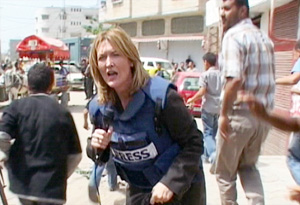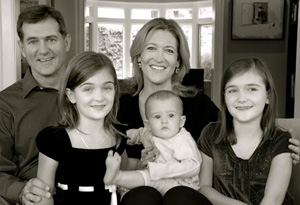An Intifada Against Breast Cancer

Photo: Fox News Channel
Jennifer Griffin, a Fox News war correspondent, spent years covering conflict in the middle east. She is now bringing attention to a fight that personally affected her and millions of women around the world.
On September 28, 2000, Ariel Sharon set foot on the Temple Mount in Jerusalem at what turned into the start of the Palestinian Intifada. I was there that day and stood near Jerusalem's Western Wall as rocks began flying down onto Jewish worshipers and Israeli soldiers fired on rioting Palestinians. Nine years to the day later, I was diagnosed with a 9-centimeter tumor in my breast. I was told I had triple negative breast cancer, a type of aggressive cancer that strikes young women. So on September 28, 2009, I began my own intifada against breast cancer ("intifada" in Arabic means "throwing off"). The cancer had set up a base in my right breast and needed to literally be "thrown off."
It is fitting that after a long winter and a complete pathologic response to chemo—meaning there is no evidence of disease left—I would help Susan G. Komen for a Cure bring the first Race for a Cure to Jerusalem this October.
Susan G. Komen's sister, Nancy Brinker, promised her sister who was dying of breast cancer 27 years ago that she would end this scourge. The first race was held in Texas for 800 participants. This year alone, 1.5 million people worldwide will race. Jerusalem will be just one of 17 international races, but it is significant that the race will finally go to Jerusalem—a city holy to the world's three monotheistic religions, a city that means so much to me and my family.
My husband, Greg Myre, and I lived there for nearly eight years covering every day of the intifada. He worked for the New York Times and Associated Press. I covered the story for Fox News. Our two daughters were born in Jerusalem, in a delivery room at Haddassah Mt. Scopus hospital overlooking the Old City walls. I wore a flak jacket most days to work as I covered the fighting during my two pregnancies. Little did I know that the real danger to my life was sitting inside my breast.
Israel is significant in the Global Fight Against breast cancer because it received Komen's first international Promise grant and its scientists were among the first to map the BRCA1 gene that is inherited by many breast cancer patients, a huge step forward in terms of screening and prevention of breast cancer deaths. Many of our sisters who are BRCA1 positive have opted for prophylactic mastectomies that have saved their lives. E.D. Hill, my former colleague at Fox, is one of them.
Around the world this year, more than 1.3 million new breast cancer cases will be diagnosed and more than 465,000 people will die from the disease. According to Komen statistics, every 68 seconds, a woman somewhere in the world dies from breast cancer. When Greg and I lived in Pakistan in the early 1990s, the world's second-largest Muslim country did not have a cancer hospital until Imran Khan, the famous World Cup cricket star then married to Jemima Goldsmith, built one in Lahore in honor of his mother who died of the disease. It had the country's first CT scan, if you can imagine. That was less than 20 years ago.

A dear friend from Pakistan who has written books on the Taliban visited me during my chemotherapy. Just before my mastectomy, he asked, "Darling, are they going to reconstruct them?" He meant my breasts. I said: "Of course, Ahmed. They will do immediate reconstruction." He looked shocked and told me that in Pakistan they just give women two strap-on prosthetic breasts to wear under their shalwar kameez and don't bother reconstructing. In Saudi Arabia, women still need the permission of their husbands to get a mammogram. I can honestly say now that my breasts, three weeks after a double mastectomy, look better than they did before—and they weren't bad before!
The race in Jerusalem will be open to all faiths, all groups, Palestinians, Israelis and anyone from around the world in spite of the political tensions in the city that often divide, according to a vow from Komen organizers and the mayor of Jerusalem, Nir Barkat. Breast cancer knows no boundaries, and therefore maybe it will be a way to set aside political and religious differences for one day to unite half of the world: women, who bear the brunt of this awful disease. Mayor Barkat has promised to turn the Old City Walls pink on the day of the race, October 28, 2010. The 5K course will go around the Old City Walls. If you want to join a team and you are in the United States, you can purchase a package tour in which nearly half of the proceeds go to Komen and its research and prevention efforts. Visit Komen.org/Israel for the details if you want to join the race!
Along with this historic first race, Komen is trying to prevent a breast cancer "tsunami" worldwide. It is already offering Promise grants in 25 countries, and during the weeklong race week in Jerusalem from October 25 to 29, it will host a think tank of 50 scientists, nanophysicists, bio-imagers, oncologists and imagers to come up with a more cost-effective portable screening device or technology that will be even better than mammography. The seed grants will be $50,000 to $100,000 each. Neither mammography nor MRIs are good enough to detect breast cancer, but they are the best we have right now.
My 9-centimeter tumor grew between mammograms (as many triple negative tumors do) and while I was pregnant. If you are pregnant or nursing, do not think that you are immune from breast cancer. Keep a close eye on any odd changes in your breast. Be very familiar, because this cancer is opportunistic and, as of yet, your ob-gyn does not have a way of screening you during this period, yet more and more young women are finding that their cancers are appearing during pregnancy and lactation.
I challenge Komen to come up with a screening test during this vulnerable period for women as well. My husband and my two daughters will be in Jerusalem for the race on October 28. I hope you'll join us.
Are you attending a Race for a Cure or have you participated before? Leave your comments below.
Learn more about the Susan G. Komen Race for a Cure in Jerusalem
Keep Reading:
Jennifer's battle with breast cancer
11 tips to get through chemo
Fight cancer with food
The race in Jerusalem will be open to all faiths, all groups, Palestinians, Israelis and anyone from around the world in spite of the political tensions in the city that often divide, according to a vow from Komen organizers and the mayor of Jerusalem, Nir Barkat. Breast cancer knows no boundaries, and therefore maybe it will be a way to set aside political and religious differences for one day to unite half of the world: women, who bear the brunt of this awful disease. Mayor Barkat has promised to turn the Old City Walls pink on the day of the race, October 28, 2010. The 5K course will go around the Old City Walls. If you want to join a team and you are in the United States, you can purchase a package tour in which nearly half of the proceeds go to Komen and its research and prevention efforts. Visit Komen.org/Israel for the details if you want to join the race!
Along with this historic first race, Komen is trying to prevent a breast cancer "tsunami" worldwide. It is already offering Promise grants in 25 countries, and during the weeklong race week in Jerusalem from October 25 to 29, it will host a think tank of 50 scientists, nanophysicists, bio-imagers, oncologists and imagers to come up with a more cost-effective portable screening device or technology that will be even better than mammography. The seed grants will be $50,000 to $100,000 each. Neither mammography nor MRIs are good enough to detect breast cancer, but they are the best we have right now.
My 9-centimeter tumor grew between mammograms (as many triple negative tumors do) and while I was pregnant. If you are pregnant or nursing, do not think that you are immune from breast cancer. Keep a close eye on any odd changes in your breast. Be very familiar, because this cancer is opportunistic and, as of yet, your ob-gyn does not have a way of screening you during this period, yet more and more young women are finding that their cancers are appearing during pregnancy and lactation.
I challenge Komen to come up with a screening test during this vulnerable period for women as well. My husband and my two daughters will be in Jerusalem for the race on October 28. I hope you'll join us.
Are you attending a Race for a Cure or have you participated before? Leave your comments below.
Learn more about the Susan G. Komen Race for a Cure in Jerusalem
Keep Reading:
Jennifer's battle with breast cancer
11 tips to get through chemo
Fight cancer with food



